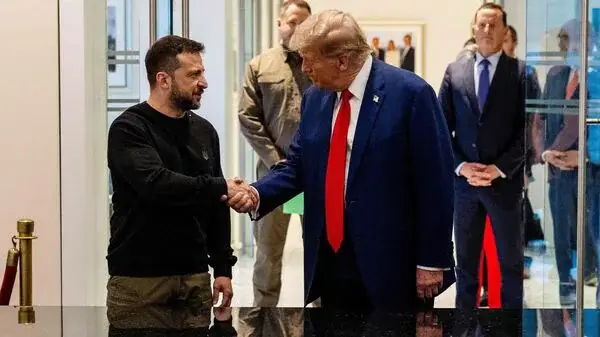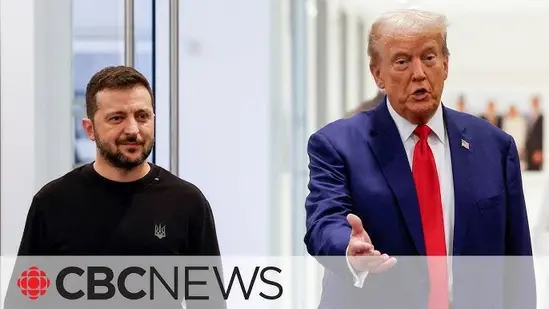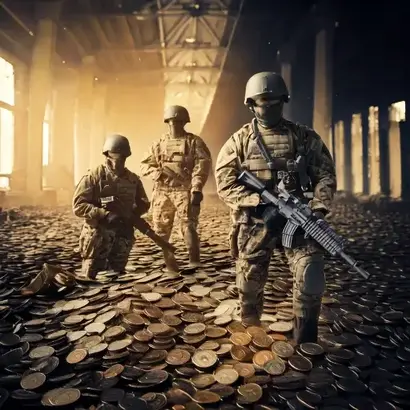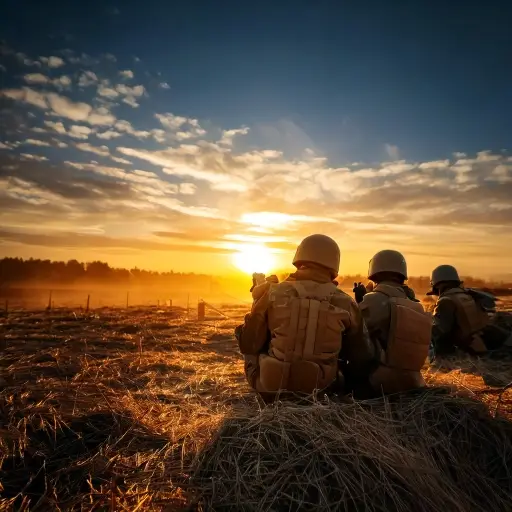The Fiery Encounter Between Trump and Zelenskyy in the Oval Office
The recent Trump-Zelenskyy meeting in the Oval Office has dominated global headlines, leaving many questioning the future of Ukraine-U.S. diplomacy. With tensions mounting due to the Ukraine war, the meeting, anticipated as a strategic discussion, quickly spiraled into a heated exchange. President Zelensky arrived in Washington, D.C., seeking reaffirmation of U.S. support, but the conversation with Donald Trump took an unexpected turn.
What Happened in the Trump-Zelensky Meeting?
Political analysts from Fox News, CNN News, and The New York Times (NYT) describe the Trump and Zelensky meeting as a diplomatic standoff. Reports from Reuters and NBC News suggest that the discussion centered around U.S. military aid, the Ukraine minerals deal, and the broader implications for NATO security.
According to MSNBC News, sources close to the meeting confirmed that Trump and Zelensky today debated the future of U.S. assistance to Ukraine, with Trump questioning Zelenskyy’s approach to negotiations with Russia and Vladimir Putin. The breaking news from multiple outlets described the interaction as an Oval Office meeting filled with tension, where Trump reportedly accused Zelenskyy of “gambling with World War 3.”
The Ukraine Minerals Deal: A Key Sticking Point
One of the most contentious points of discussion was the Ukraine minerals deal, which proposed a partnership between the U.S. and Ukraine to extract and export critical minerals vital for defense and technology. This deal was backed by key figures such as Vice President JD Vance, Marco Rubio, and Lindsey Graham, who viewed it as an essential strategy for securing Western supply chains.
However, according to Politico and The Atlantic, the agreement fell apart amid disagreements over conditions and geopolitical concerns. Bret Baier Zelensky analysis on Fox News Zelensky interview revealed that Trump questioned whether Ukraine’s resources should be leveraged in exchange for military assistance.

Diplomatic Fallout and Global Reactions
Following the Trump Zelensky press conference cancellation, international responses varied. European leaders, including Kaja Kallas, reaffirmed their commitment to stand with Ukraine. Meanwhile, Vladimir Putin and Dmitry Medvedev from Russia capitalized on the fallout, pushing narratives that portrayed Ukraine as unstable.
Within the U.S., reactions from Liz Cheney, Tomi Lahren, and Don Bacon highlighted divisions within American politics regarding ongoing aid to Ukraine. Newsmax and Daily Caller reported that Brian Glenn, a reporter, revealed concerns that the meeting could signal a shift in U.S. foreign policy.
Video and Media Coverage: Trump-Zelenskyy Meeting Live
The Trump Zelensky meeting video went viral across media platforms, including Fox News Live, CNN Live, and PBS Newshour. ABC News and NPR News covered key moments, while outlets like Hudson Institute and Truth Social Trump amplified discussions on what happened with Trump and Zelensky.

What’s Next for U.S.-Ukraine Relations?
The reaction to Trump Zelensky meeting is still unfolding, with many wondering, “What did Trump do today?” and how it impacts Ukraine’s strategy. While the Trump Zelensky argument raised concerns, it also highlighted the evolving dynamics of international diplomacy.
For continued updates on Ukraine news, world news, and U.S. diplomacy, explore more on TalesGo.com. What are your thoughts on this heated exchange? Share your views in the comments!
💰 The Price of War: Ukraine’s Fight for Survival
The Russia-Ukraine war has become one of the costliest conflicts of modern history—not just in terms of lives lost, but also in economic, political, and social devastation. Ukraine, backed by Western allies, continues to resist Vladimir Putin’s aggression, while Russia sinks deeper into its imperial nostalgia, convinced that tanks and outdated Soviet strategies will somehow resurrect its former glory.
The numbers are staggering. According to Reuters and The New York Times (NYT), the war has cost Ukraine hundreds of billions of dollars, with infrastructure damage alone exceeding $150 billion. Meanwhile, Russia’s war expenditures have drained its economy, leading to inflation, sanctions, and an exodus of businesses. But let’s not forget—while some nations suffer, others see opportunity.
🔥 Who Pays the Price? Lives Lost and Economies Shattered
The biggest sacrifices in this war have been made by the Ukrainian people. Over 10 million people have been displaced, cities like Mariupol and Bakhmut have been reduced to rubble, and the human cost continues to rise. Reports from Fox News, CNN, and BBC estimate that tens of thousands of soldiers and civilians have been killed, with many more wounded.
Meanwhile, Russia’s losses remain a mystery. The Kremlin continues to hide its casualty numbers, but reports from MSNBC News and independent sources suggest that Russia has lost over 300,000 soldiers—a number that keeps rising as Putin throws poorly trained conscripts into the battlefield. Yet, Russian propaganda insists that everything is “going according to plan.” Sure, if the plan was to become a global pariah while its youth flee the country.
📉 Economic Collapse: Sanctions and Struggles
While Ukraine struggles to rebuild, Russia faces economic isolation. Thanks to sanctions from the U.S., EU, and other allies, Russia has been cut off from global trade, its oil and gas revenues shrinking, and its GDP declining. Even once-loyal partners like China and India have reduced their dependency on Russian exports, preferring not to anger the West.
At the same time, Ukraine, despite being on the front lines, has managed to secure massive financial support. The United States, European Union, and international financial institutions have provided Ukraine with over $200 billion in military and economic aid. President Zelenskyy continues his diplomatic efforts, ensuring that Ukraine’s war effort remains a global priority.
🏦 Who Profits from the War?
War is a tragedy, but let’s not be naive—some people always profit.
- Western defense contractors are seeing record profits as demand for weapons skyrockets. Companies like Lockheed Martin and Raytheon have seen their stocks soar as the U.S. continues to supply Ukraine with advanced weaponry.
- Energy giants have also benefited, as Europe’s shift away from Russian gas has driven up prices, allowing U.S. and Middle Eastern suppliers to fill the gap.
- Black markets thrive, with Russian oligarchs finding creative ways to dodge sanctions and sell oil through shady third parties.
Meanwhile, Russia’s war chest shrinks, its citizens suffer under economic hardship, and yet, the Kremlin continues its delusions of grandeur, pretending that its army is still a mighty force rather than a graveyard of outdated Soviet machinery.
🛑 When Will It End?
Despite the overwhelming support for Ukraine, the war shows no signs of stopping. The conflict has reached a point where neither side is willing to back down. Some experts believe 2025 could bring a turning point, but only if Ukraine receives continued military aid and Russia faces further economic and military exhaustion.
🔥 Conclusion: The War’s True Legacy
The Ukraine war is more than just a battlefield struggle; it’s a fight for democracy, sovereignty, and the future of global security. While Ukraine pays the ultimate price, the world watches, some offering help, others counting their profits. And as for Russia? It continues its self-destruction, all in the name of reviving an empire that ceased to exist decades ago.

🚀 Stay updated with the latest global insights on TalesGO.com. Share your thoughts—who really benefits from this war?
🔮 What’s Next for the War in Ukraine? Predictions & Harsh Realities
The war in Ukraine has become a defining conflict of the 21st century, reshaping global alliances, draining economies, and rewriting military strategies. But what happens next? Let’s explore some possible scenarios, the hidden costs, and yes—let’s throw in a little sarcasm about Russia’s grand “master plan.”
1️⃣ Western Support for Ukraine: The Lifeline That Won’t Snap (Yet)
The U.S., the EU, and NATO allies have poured hundreds of billions of dollars into Ukraine. And despite political debates, the reality is simple: they’ve invested too much to let Ukraine collapse.
Even if Donald Trump makes a political comeback, cutting off aid completely would be easier said than done. Why? Because the U.S. military-industrial complex is having a field day, and European nations know that if Ukraine falls, they’re next in line for Russian “peacekeeping.”
Prediction:
✅ Ukraine will keep getting weapons, just enough to not lose—but maybe not enough to win quickly.
2️⃣ Russia’s Internal Problems: The Bear Is Starving
Russia’s economy is like a Soviet Lada—still running, but barely holding together with duct tape and propaganda. Sanctions are squeezing revenue, military spending is out of control, and Russia is bleeding talent as educated professionals flee to anywhere that doesn’t require standing in line for sugar.
Meanwhile, dissent inside Russia is growing. No, a revolution isn’t likely yet, but cracks are forming. Elites are getting nervous, and even the most loyal citizens are questioning if endless war is really the flex Putin thinks it is.
Prediction:
❗ If Russian losses continue to mount, expect more political backstabbing in Moscow—maybe even a “surprise” leadership shake-up.
3️⃣ A Ukrainian Counteroffensive in 2025?
Right now, Ukraine is holding the line, but major territorial gains require more than just bravery—they need long-range missiles, fighter jets, and manpower.
With F-16s finally arriving and advanced Western tech making its way to the front, 2025 could see a serious Ukrainian push to reclaim lost territory. But, war isn’t just about firepower—it’s about logistics, morale, and outlasting the other side.
Prediction:
📌 Ukraine may not liberate everything in 2025, but strategic gains are possible—especially if Russian forces keep self-destructing through corruption and incompetence.

4️⃣ Peace Talks? Don’t Hold Your Breath
Russia isn’t interested in peace—at least, not real peace. Every time negotiations come up, Moscow plays its usual game:
- Demand unrealistic concessions (Give us half your country, then we’ll “consider” a ceasefire).
- Pretend to be the victim (The West is forcing us to bomb civilians, really!).
- Violate any agreements within five minutes.
Prediction:
🤡 Any “peace talks” in 2025 will be political theater, unless Russia is pushed into a corner so tight they can’t even do their usual bluffing.
5️⃣ Russia’s New Strategy: The “Mineral Diplomacy” Gambit
What’s better than oil and gas blackmail? Rare minerals blackmail! Ukraine has massive reserves of critical minerals like lithium, and Russia would love to control them.
Moscow is already cozying up to China, hoping to create an economic counterweight to Western dominance. Meanwhile, expect Russia to make shady “resource deals” with rogue states, offering metals in exchange for weapons, drones, and diplomatic cover.
Prediction:
🌍 The war isn’t just about land—it’s about resources, and Russia will use every dirty trick in the book to control Ukraine’s wealth.
6️⃣ A New Cold War: The World Is Picking Sides
Forget a return to normal—we’re entering a new geopolitical era. NATO is expanding, Europe is rearming, and the West is pulling supply chains away from Russia and China.
Meanwhile, Russia is making friends with the world’s worst dictators, because, well, that’s all they have left. North Korea, Iran, and a handful of other pariahs are more than happy to swap weapons for influence.
Prediction:
🛰️ Expect more cyber warfare, disinformation campaigns, and proxy conflicts as the world splits into two camps—those who believe in democracy and those who believe in stealing washing machines from occupied territories.
🔚 The Bottom Line: How Does This End?
This war won’t end overnight, and 2025-2026 will be critical. Here’s what we know:
✔️ Ukraine is not giving up—with or without Western help.
✔️ Russia is bleeding economically and militarily—but Putin still hopes to outlast Ukraine’s will.
✔️ The world is adapting—expect deeper NATO involvement, more sanctions, and a long-term strategy to isolate Russia.
📢 Final Thought:
At some point, Moscow will have to decide: continue self-destructing or finally face reality? Until then, the world watches, waits, and prepares for the next chapter in this brutal war.


